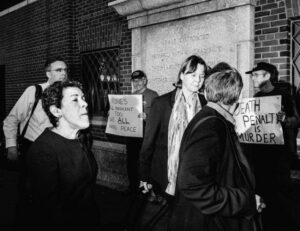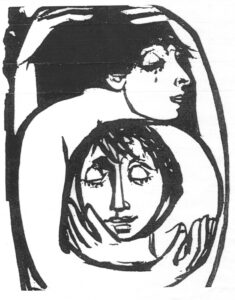“Boston Strong”
In the immediate aftermath of the Marathon Bombing, I found it nearly impossible socially to say anything openly empathetic towards the Tsarnaev brothers. When I ventured philosophical or theological thoughts about historical perspective, that this carnage is the outcome of our bombing our way into other countries, or about forgiveness, I sensed from my listeners, even among peacemaking friends, a “no comment” reserve. The message: “Better not to talk about it.” Instead, we in Massachusetts were urged to be “Boston Strong.” People were killed and maimed. Now is not the time for religious language, non-retaliation. Don’t talk about complexities, nuances like Scripture and Jesus. This is different. “Boston Strong.”

First Glimpses of Judy Clarke
During this period, I was increasingly drawn to the profile of Dzhokhar Tsarnaev’s lead attorney, Judy Clarke, my Christian feminist, activist instincts heightened by the modesty of her dress and appearance, her serious demeanor and that she had taken on other heinous death penalty cases while maintaining a passionate stance against it.
“This is a woman to be reckoned with” I thought. How can anyone absorb all of this pain, public scrutiny and depressing narratives of the murdered and the murderers? As I read about her sparring with the imperturbable Judge O’Toole in the Tsarnaev trial, I sensed the unfolding of a classic gender battle: a strong, tall, imposing woman of austere bearing vs. an intransigent aggressively pro-death penalty judge, who wanted a death sentence in Massachusetts, at any cost.
A recent New Yorker article by Patrick Radden Keefe, (September 14, 2015) depicted Judy as a lawyer who is involved in a “labor of empathy,” traveling as she did to the Caucasus to understand Dzhokhar’s family. Clarke believes in “the essential goodness of each client,” demonstrating “humility… generosity and devotion” to the depraved and mentally ill. This portrait offers a sharp contrast in the unfolding cosmic drama between two women, Judy Clarke and Carmen M. Ortiz, the US attorney for Massachusetts. Ortiz, in pushing for the death penalty for Dzhokhar, said: “We will continue to do all we can to protect and vindicate those injured and those who have passed away” by refusing any pleas, maintaining that death is the only option for a federal crime of such magnitude.
The first time I spotted Judy passing by in the vigil line outside of the Moakley Courthouse, I was struck by her serious demeanor, eyes to the ground, purposeful stride, as she passed the few of us standing in the vigil line. And when I say “few of us” I mean “few.” Before the trial began, together with Pat Ferrone of Pax Christi and Agape, we had reached out to MCADP (Massachusetts Committee Against the Death Penalty), Amnesty International, the Catholic Conference, the office of Cardinal O’Malley and the heads of all the diocesan offices in MA—to no immediate avail, especially in terms of a public witness at the Courthouse. The lone exception was Veterans for Peace, led by Joe Kebartas, who has stood against state sanctioned murder from day one.
 Where Was the Religious Community in Massachusetts?
Where Was the Religious Community in Massachusetts?
Cardinal O’Malley and area Bishops did eventually publish an anti-death penalty statement, but nothing more and only once. Pastors were not asked to read the statement from the pulpit, making pro-life connections to abortion and war. Given my own increasing sense of how alone Pat Ferrone and our handful of Veterans for Peace, Pax Christi, Quaker, Catholic Worker and Just Faith cohorts felt as we went about trying to galvanize religious support, I often reflected on how Judy and the defense team must experience their work, without significant local or national outcries to buttress their attempts to humanize the demonized Dzhokhar.
Agape received an email from MCADP stating that as an organization, they continued to “emphasize…our sympathy for the numerous victims of the bombing” concerned that “a presence on the opening day…showing opposition to the death penalty, will be seen as favoring the defendant and anti-victim.” Their spokesperson promised that they were continuing to develop a “strategy” and that they would keep us informed. This never happened.
My sense of kinship with Judy Clarke increased as I observed the steady drumbeat of death and the wall of silence from faith communities in Massachusetts. In a room inside the courthouse reserved for onlookers at the trial, I could see Judy leaning toward Dzhokhar to comment, occasionally touching his arm. I felt the same protective, maternal instincts towards Dzhokhar, even as I gasped inwardly each time I saw one of the victims in a wheelchair, or wearing prosthesis. In addition to the horrific victim impact statements, much was reported in local media about Dzhokhar’s seeming stony indifference, portraying him as unfeeling, calloused, beyond redemption: a detached zombie.
The handful of us in the vigil often asked each other: Where are all of the anti-death penalty people and peace and justice groups? It became apparent that within the religious community, anti-death penalty sentiment would not include public statements to spare Dzhokhar’s life, nor public witness, at least not in the climate of the worst “terrorist attack” on American soil since 9/11, and in one’s own backyard. The presence of the victims and their daily bone-chilling testimony, accompanied by grisly pictures, seemed beyond the capacity of most to look at or absorb. In an attempt to present a counterpoint to these gruesome depictions, which seemed to express the publicly stated wishes of many of the victims that Dzhokhar die, Judy Clarke and the defense contacted Sr. Helen Prejean, who had been visiting Dhokhar under extreme security measures, to testify on his behalf.
Gender and the Marathon Bombing Case
Women were out front in this case, from Dhokhar’s mother who advanced an extremist Muslim position with her sons, to Miriam Conrad and Judy Clarke, pitted against Carmen Ortiz and her team. I was struck by the gender and religious implications in a largely Catholic state, of calling on a woman religious, Sr. Helen Prejean, under the headlights of a clearly biased judge, apparently also Catholic, and a slick prosecutorial team whose case was gaining momentum daily in the face of the victims’ reporting of their physical and psychic pain.
I think of Judy Clarke as a sister in spirit with whom I feel a deep, visceral resonance, even now in the aftermath of the trial with Dzhokhar’s death sentence, guilty on all 30 counts, and as he currently resides in Maximum Security hell called ADX in Florence, CO. (The defense team has already filed its appeal).
My admiration for Clarke grew after reading Keefe’s article, “The Worst of the Worst” and his portrait of Judy as a woman who “excelled at saving the lives of notorious killers” coupled with her defense colleagues’ view that she simply is “the best death penalty lawyer in America.” A soul-searcher who “never lost a client to death row,” I saw “Saint Judy” (appellation given her by other death row attorneys) early on, in at least a spiritual, if not religious light. Like Jesus, she saw the “worst of the worst” or “the least of the least”, as “one of us.” She believes, as Jesus did, that “people aren’t born evil” and that even murderers are not beyond redemption.
“Mercy’s Never Earned”
Judy learns “lessons” in “human behavior and human frailty” from her clients, while adopting an attitude of “there but for the grace of God…” As Jesus called for Mercy, not sacrifice (Matthew 9:13), so did Judy Clarke in her closing arguments at Dzhokhar’s trial, in the gesturing and articulating of a preacher, reminding judge and jury: “Mercy’s never earned. It is bestowed. And the day allows you to choose justice and mercy. I ask you to make a decision of strength, a choice that demonstrates the resilience of community. We ask you to choose life.” (Duet. 30:19).
Straight out of Shakespeare (“the quality of Mercy is not strained”), Matthew’s gospel and Hebrew Scripture, Clarke’s courageous and prophetic voice pointed to how disintegrated and “un-resilient” as a community Boston and the Catholic peace and justice network was. As evidence, e-mails over a three month period to colleges, universities, professors and organizations standing for peace and justice, to join us in some way, to invite some of us to speak in classes, went unanswered. No single invitation during the trial came from any diocese in New England to speak on the subject of Catholic teaching on the Death Penalty.
Perhaps religious communities in Massachusetts were in denial. Maybe they believed that an anti-death penalty state like Massachusetts since 1984 would not produce a jury wedded to vengeance and retaliation. This, in spite of the reality that jurors could only be selected on the grounds that they could vote for the death penalty: any moral grounds of opposition and you were disqualified.
The day of Dzhokhar’s sentencing, Judy passed us one last time in front of the Moakley Courthouse, looking tired and sad. The thought that hit me was once again biblical: “Here comes a Suffering Servant.” Clarke was carrying the wounds of a nation, of a city, as post 9/11 retribution was being made available vicariously to the world through this trial, this young man. The US invasions of Afghanistan and Iraq, seemed a distant memory, unmentioned as part of the revenge calculus on both sides, except for Dzhokhar’s bloody missive on the side of the boat: “The U.S. government is killing our innocent civilians, but most of you already know that.” Such depth of analysis would rarely play out in the press or among the silent religious organizations.
The “well of compassion” in Judy, her friends remark, “runs a little deeper.” Now, in the aftermath of the trial, this well would need to be dug extra deep, to include the liberal, anti-death penalty state of Massachusetts, at one of our “worst” hours. Judy’s “labor of empathy” was shattered into bits. This, despite the plea of Bill and Denise Richards, whose son, Martin, was killed in the bombing (and whose daughter lost a leg, and Denise, the Mother, an eye) that the jury not impose the death penalty, but rather life in prison.
Judy Clarke went a step further than the Richards did, urging the jurors not to act out of retaliation: “That’s not who we are,” reminding these Massachusetts citizens that they were “under no obligation to vote for death.” Clarke called them and us to our higher nature, asking us to rise out of the dark abyss of media complicity in a tragic drama of revenge. Post-sentencing, a lone juror confessed that if the Richards had made known their sentiments to the jury, he may have voted differently.
Could the Outcome Have Been Different?
Clarke could not convince the jury to take this leap of empathy—“there but for the grace”…I am Martin Richards; I am Dzhokhar Tsarnaev. When exposed to the reality of what bombs do on our own soil, we who follow Jesus become paralyzed, fail to see the balance sheet, submerge our deepest feelings about the wrongness of capital punishment as a country and a state, and decide as many individuals and peace groups seemed to do: “Sit this one out.” Those of us at the vigil and involved in circulating the national statement against the death penalty for Dzhokhar realized that as we struggled among ourselves for the right phrasing on our banners, the right presence at the courthouse and the right words in interviews, that people did not know how to be anti-death penalty and pro-victim simultaneously. What should one say
From my vantage point, I think that Judy Clarke offered the response to this question, and unlike what the Keefe article suggested, that she did not find a key to unlock the hold of the death penalty in this case, (her first loss), I felt that she did. She unlocked the tightly sealed door of compassion for the victims and victimizer, her words offering us a glimpse of Christ: “We have come face to face with tragedy, suffering and grief. There is no excuse. No one is trying to make one.” Nonetheless she asks for a sentence, “Yes, even for the Boston Marathon bomber…that reflects justice and mercy.” She comforted the victims, not trying to explain away their ineffable pain and loss. She seems to absorb the meaning of unspeakable human suffering and translate it, although perhaps unintended, into Christ-like, enemy love.
I ask myself: “Could the outcome have been different had a coalition of Peace and Justice, women religious and priests (where was San Egidio, the international anti-death penalty organization located at Boston College in MA?), Catholic parishes, New England Bishops, other clerics, held press conferences, made statements in solidarity with the victims, but also in opposition to the Death Penalty for Dzhokhar before and during the trial? We will never know. Naively perhaps, I had expected a lifting up of moral purpose and conviction.
Sealed security documents reveal that: “Tsarnaev had already expressed remorse for his actions” long before the trial began, offering to resolve his case without a trial, pleading guilty and writing a letter of apology. Nancy Gertner, a former federal judge in MA who teaches at Harvard, argues that there is “no legal justification for the secrecy surrounding the proceedings” and that the “suppression of Tsarnaev’s letter of apology on the grounds that it could be unsafe,” was “absurd.”
Perhaps, in the end, the Richards family will eventually be moved to forgive their son’s murderer, may even visit him, plead for him, as they move through their ordeal, and past Marathon Monday 2013. As expressed in their statement to the press, they believe in the “resiliency of the human spirit.”
Perhaps we will all join them as they “turn the page, end the anguish, and look for a better future,” by calling for reconciliation, forgiveness and the mercy of God for all of us. Their son Martin will then become a symbol of the extraordinary power of good and a cry for the abolition of the Death Penalty in the United States.
In the words of Bill Richards, Martin’s father, on the day that Dzhokhar received his sentence of death: “We choose love. We choose kindness. We choose peace.”
*The prosecution referred to Tsarnaev as Dzhokhar, his given name, which is Chechen and means “jewel.” But as Clarke addressed the jury she used the nickname that he had adopted as a high-school student, in Cambridge, Massachusetts: Jahar.” (Keefe, New Yorker)
